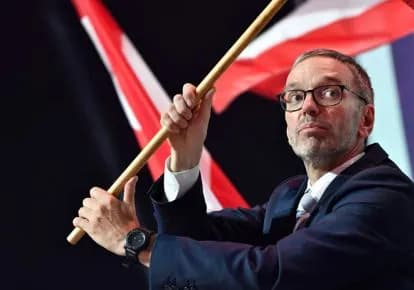Herbert Kieckl may become the new Chancellor of Austria
Kyiv • UNN
After Karl Nehammer's resignation, Austria found itself in a political crisis. The leader of the right-wing populist FPÖ party, Herbert Kieckl, has a real chance to lead the government thanks to the support of 29% of voters.

Austria is on the verge of a major political crisis, and Herbert Kieckl, leader of the right-wing populist FPÖ party, is likely to become the new head of government. This is reported by UNN with reference to NZZ.
Details
The political landscape is changing following the resignation of Chancellor Karl Nehammer, and Kieckl, who previously gained support for his tough approach to migration and security, now has a realistic chance of becoming the next chancellor.
Crisis in the ÖVP and preparations for a coalition with the FPÖ
After the parliamentary elections in October, Austria found itself in a situation of political uncertainty. Internal problems within the largest party, the ÖVP, forced Nehammer to announce his decision to resign as chancellor. This opens the way for new political maneuvers. The party is in chaos, and the newly elected leader of the ÖVP, Christian Stoker, has announced that he is ready to negotiate with the FPÖ on a possible coalition. However, just a few weeks ago, the ÖVP rejected the possibility of such an alliance, in part because of Kickl's radical positions on migration and the European Union.
The crisis in the ÖVP is deepening due to numerous resignations of candidates for the post of a new leader and the lack of a clear development plan. One of the most famous politicians of the party, former Chancellor Sebastian Kurz, who was at the peak of his popularity for some time, now gives up any political ambitions due to scandals and corruption investigations.
Herbert Kickl and his chances to become Chancellor
Herbert Kieckl, the leader of the FPÖ, remains highly popular in the country, in part due to his tough rhetoric against illegal migration and his pro-Russian course. His party won almost 29% of the vote in the last election, which makes the FPÖ one of the main contenders for power. In addition, Kikl has established himself as a decisive politician ready for radical changes in the country, including a new migration policy and strengthening of national borders.
Although Kieckl has long been in the shadows due to his radical approach to politics, his role has now changed. Over the past few months, his support has grown, and he now looks like one of the main candidates for the chancellorship. The absence of a strong competitor among other political forces only increases his chances.
A few weeks ago, when Nehammer was trying to form a tripartite coalition with the Social Democrats and Liberals, the refusal to negotiate was already a clear sign that the chances of a stable coalition were minimal. This opens the way for negotiations with the FPÖ. Stöcker, the new leader of the ÖVP, although previously critical of Kickl, is now forced to be more open to cooperation. This became clear after he declared his readiness to take part in coalition talks if the FPÖ put forward such a proposal.
However, there are serious disagreements within the ÖVP about such a coalition. Many party members believe that any alliance with the FPÖ would be a disaster for the party, especially given the difference in views on European and foreign policy. In addition, Kickl's European course contradicts many of the ÖVP's principles, adding even more tension to an already difficult situation.
Elections, Crisis and the Future of Austria
Austria is now at a crossroads: if the negotiations between the ÖVP and the FPÖ are successful, Kieckl will become chancellor and will likely translate his ambitions into realpolitik. However, it is worth noting that not everyone in Austria is ready for a rightward turn in politics. The crisis within the ÖVP, the lack of a stable leader, and the need to quickly resolve complex issues may lead to new elections. And if they are held, support for the FPÖ may grow even more, which guarantees Kickl's leadership in the government.
Add
The outcome of the political struggle in Austria will be important not only for the country but also for Europe as a whole. Kieckl's position on migration, the EU, and foreign policy could change not only Austria's domestic course, but also its place on the European stage.
Recall
In Austria, coalition talks have failed, and the Social Democrats see the threat of an “extremist chancellor.